The AMD Ryzen Threadripper 1950X and 1920X Review: CPUs on Steroids
by Ian Cutress on August 10, 2017 9:00 AM ESTRocket League
Hilariously simple pick-up-and-play games are great fun. I'm a massive fan of the Katamari franchise for that reason — passing start on a controller and rolling around, picking up things to get bigger, is extremely simple. Until we get a PC version of Katamari that I can benchmark, we'll focus on Rocket League.
Rocket League combines the elements of pick-up-and-play, allowing users to jump into a game with other people (or bots) to play football with cars with zero rules. The title is built on Unreal Engine 3, which is somewhat old at this point, but it allows users to run the game on super-low-end systems while still taxing the big ones. Since the release in 2015, it has sold over 5 million copies and seems to be a fixture at LANs and game shows. Users who train get very serious, playing in teams and leagues with very few settings to configure, and everyone is on the same level. Rocket League is quickly becoming one of the favored titles for e-sports tournaments, especially when e-sports contests can be viewed directly from the game interface.
Based on these factors, plus the fact that it is an extremely fun title to load and play, we set out to find the best way to benchmark it. Unfortunately for the most part automatic benchmark modes for games are few and far between. Partly because of this, but also on the basis that it is built on the Unreal 3 engine, Rocket League does not have a benchmark mode. In this case, we have to develop a consistent run and record the frame rate.
Read our initial analysis on our Rocket League benchmark on low-end graphics here.
With Rocket League, there is no benchmark mode, so we have to perform a series of automated actions, similar to a racing game having a fixed number of laps. We take the following approach: Using Fraps to record the time taken to show each frame (and the overall frame rates), we use an automation tool to set up a consistent 4v4 bot match on easy, with the system applying a series of inputs throughout the run, such as switching camera angles and driving around.
It turns out that this method is nicely indicative of a real bot match, driving up walls, boosting and even putting in the odd assist, save and/or goal, as weird as that sounds for an automated set of commands. To maintain consistency, the commands we apply are not random but time-fixed, and we also keep the map the same (Aquadome, known to be a tough map for GPUs due to water/transparency) and the car customization constant. We start recording just after a match starts, and record for 4 minutes of game time (think 5 laps of a DIRT: Rally benchmark), with average frame rates, 99th percentile and frame times all provided.
The graphics settings for Rocket League come in four broad, generic settings: Low, Medium, High and High FXAA. There are advanced settings in place for shadows and details; however, for these tests, we keep to the generic settings. For both 1920x1080 and 4K resolutions, we test at the High preset with an unlimited frame cap.
All of our benchmark results can also be found in our benchmark engine, Bench.
MSI GTX 1080 Gaming 8G Performance
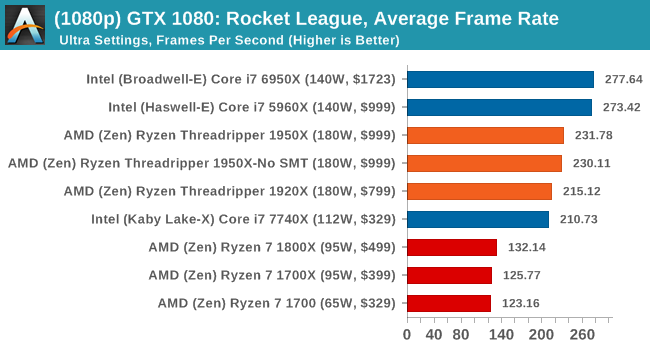
1080p

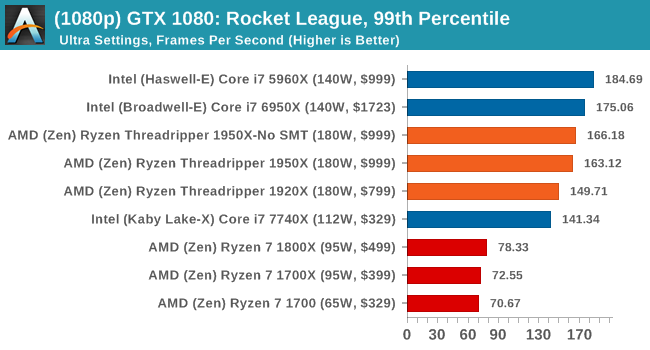
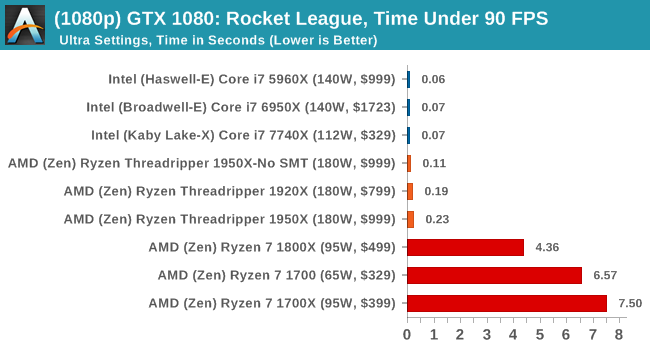
4K
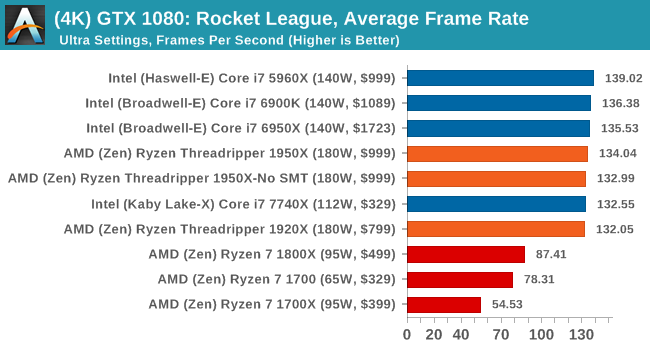
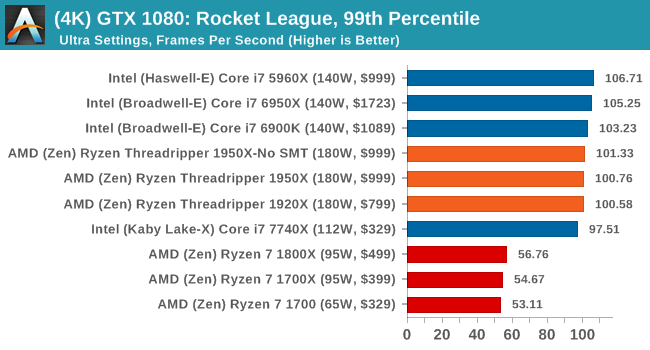
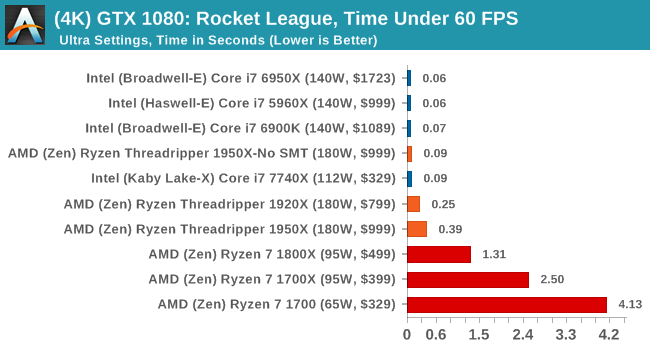
ASUS GTX 1060 Strix 6G Performance
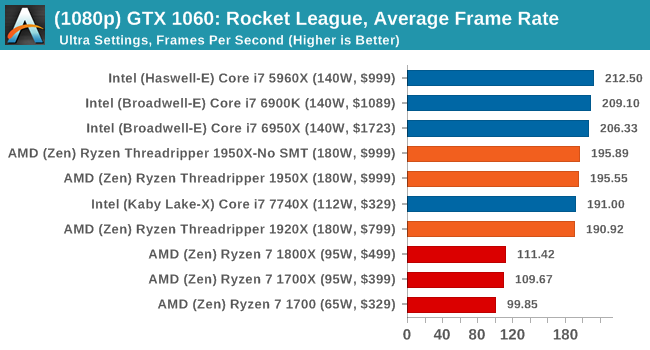
1080p

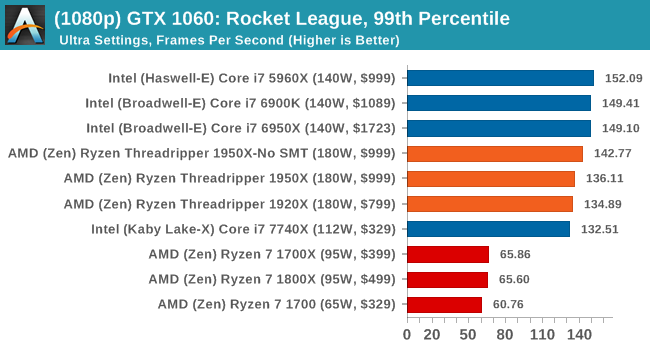
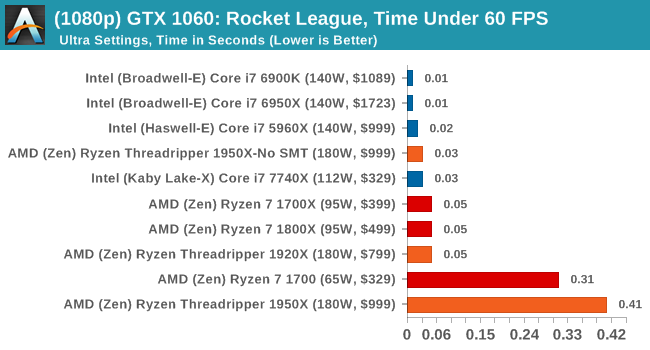
4K
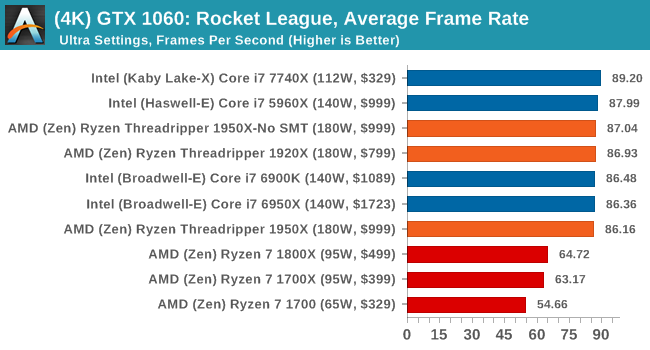
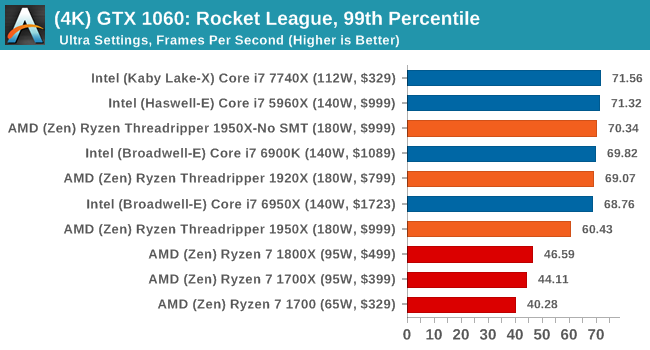
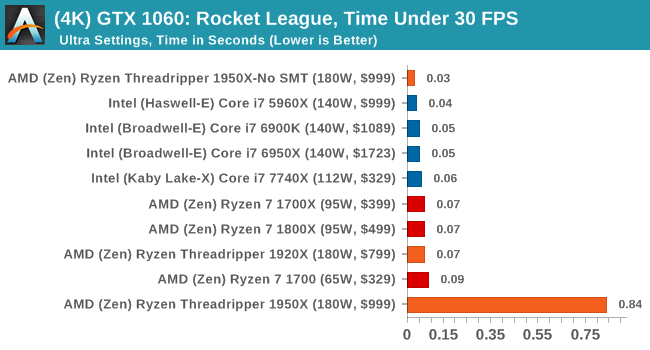
Sapphire Nitro R9 Fury 4G Performance
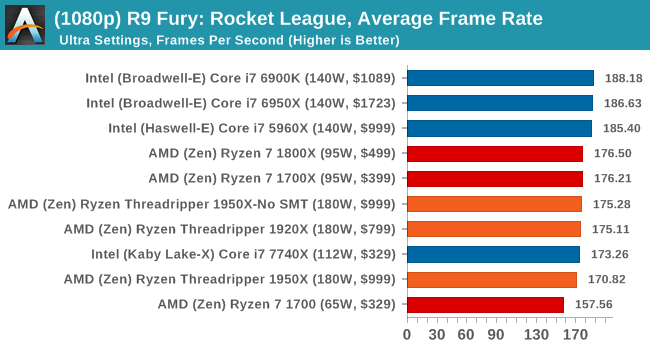
1080p

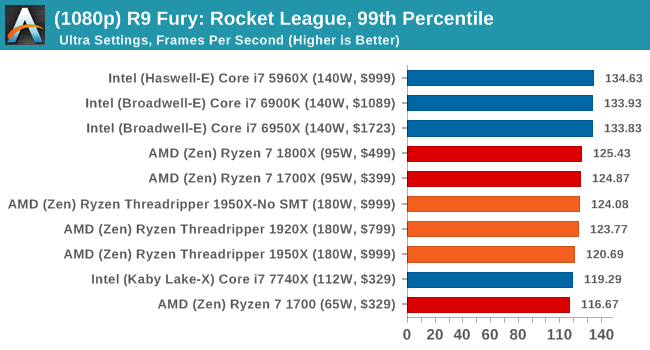
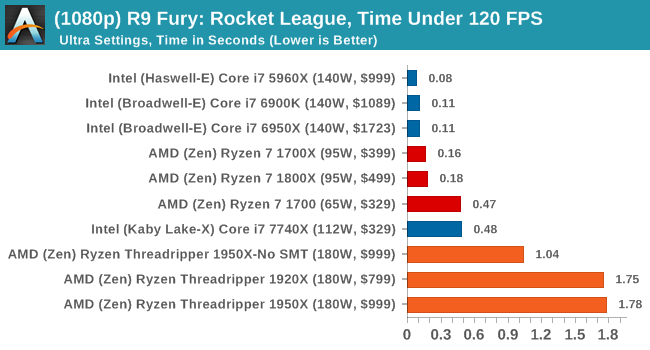
4K
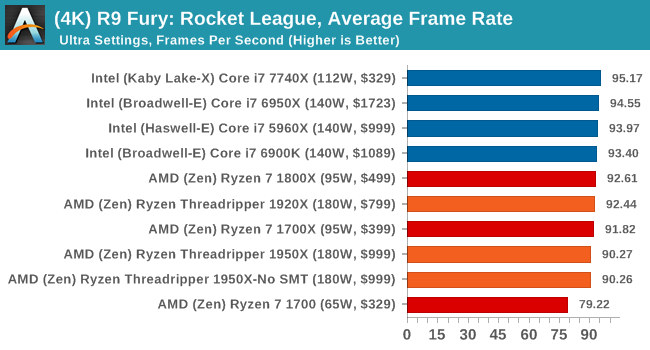
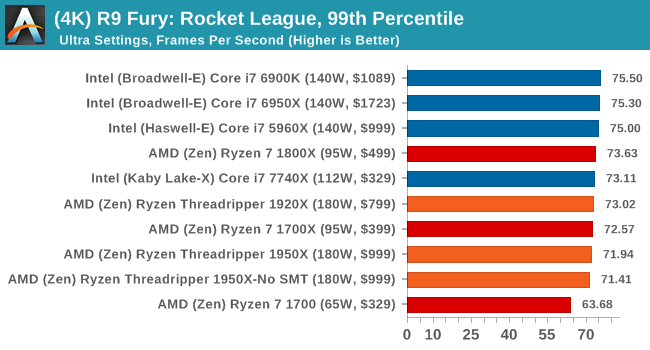
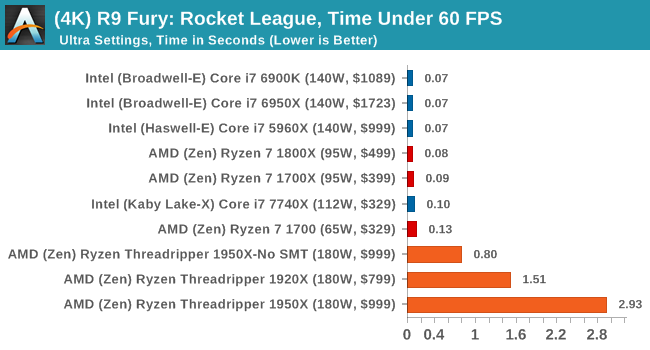
Sapphire Nitro RX 480 8G Performance
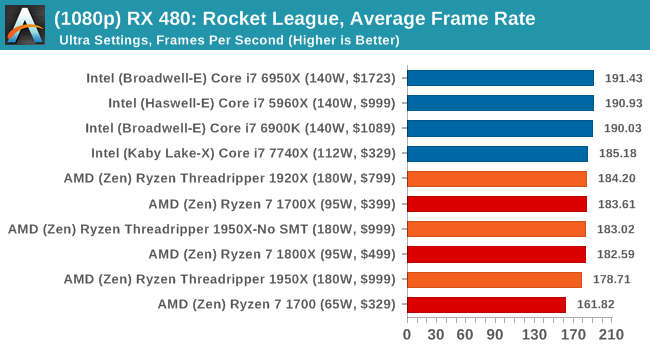
1080p

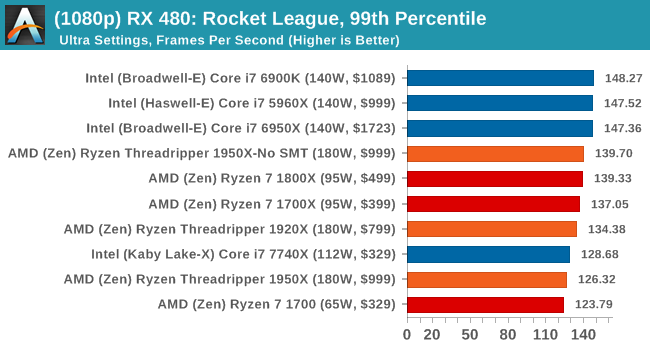
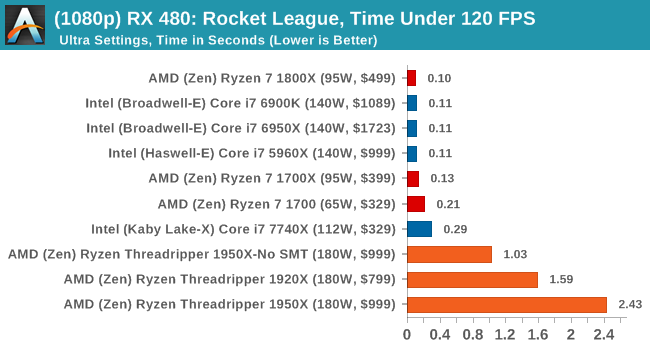
4K
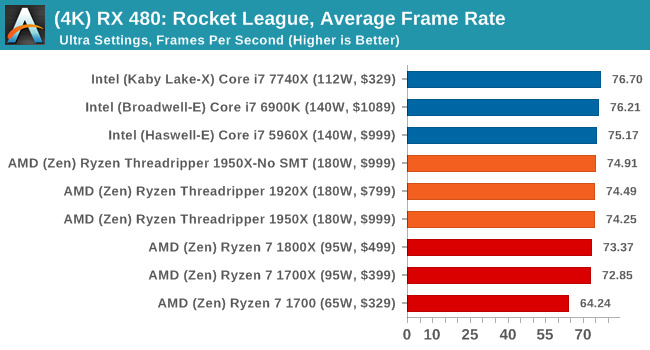
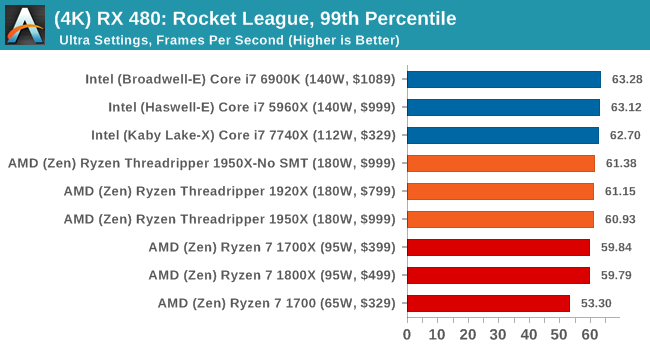
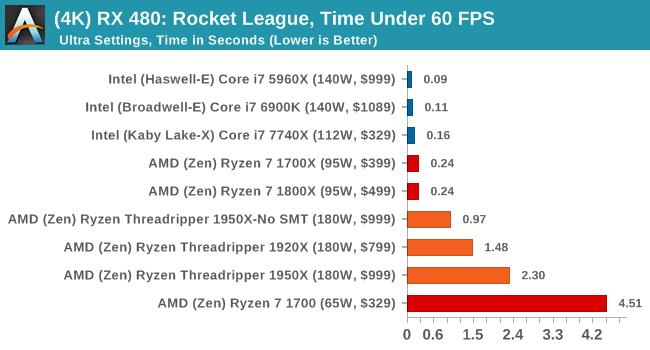
With Ryzen, we encounted some odd performance issues when using NVIDIA-based video cards that caused those cards to significantly underperform. However equally strangely, the issues we have with Ryzen on Rocket League with NVIDIA GPUs seem to almost vanish when using Threadripper. Again, still no easy wins here as Intel seems to take Rocket League in its stride, but SMT-off mode still helps the 1950X. The Time Under graphs give some cause for concern, with the 1950X consistently being at the bottom of that graph.


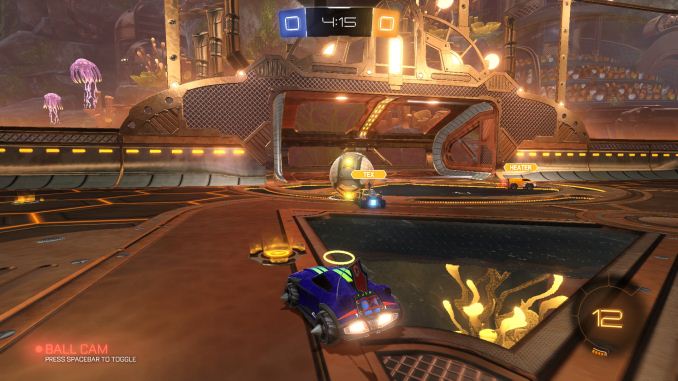
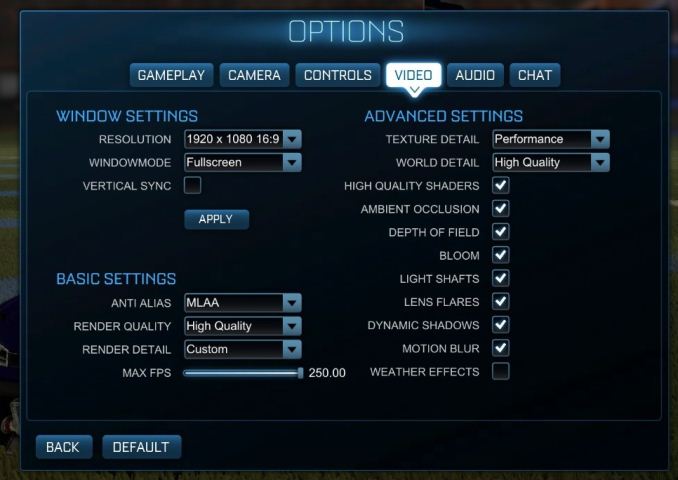








347 Comments
View All Comments
ddriver - Thursday, August 10, 2017 - link
Yeah if all you do all day is compile chromium with visual studio... Take that result with a big spoon of salt.Samus - Thursday, August 10, 2017 - link
This thing can also decompress my HD pr0n RARs in record time!carewolf - Thursday, August 10, 2017 - link
The jokes is on you. More cores and more memory bandwidth is always faster for compiling. Anandtech must have butched the benchmark here. Other sites show ThreadRipper whipping i9 ass as expected.bongey - Thursday, August 10, 2017 - link
They did without a doubt screw up the compile test. The 6950x is a 10 core /20 thread intel cpu, but somehow the 7900x has 20% improvement, when no other test even comes close to that much of an improvement. The 7900x is basically just bump in clock speed for a 6950x.Ian Cutress - Thursday, August 10, 2017 - link
'The 7900X is basically just bump in clock speed for a 6950X'L2 cache up to 1MB, L3 cache is a victim cache, mesh interconnect rather than rings.
mlambert890 - Saturday, August 12, 2017 - link
It's basically as far from 'just a bump in clock speed' as any follow up release short of a full architecture revamp, but yeah ok.rtho782 - Thursday, August 10, 2017 - link
The whole game mode/creator mode, UMA/NUMA, etc seems a mess. Games not working with more than 20 threads is a joke although not AMDs fault....mapesdhs - Thursday, August 10, 2017 - link
Why is it a mess if peope choose to buy into this level of tech? It's bring formerly Enterprise-level tech to the masses, the very nature of how this stuff works makes it clear there are tradeoffs in design. AMD is forced to start off by dealing with a sw market that for years has focused on the prevalence of moderately low core count Intel CPUs with strong(er) IPC. Offering a simple hw choice to tailor the performance slant is a nice idea. I mean, what's your problem here? Do you not understand UMA vs. NUMA? If not, probably shouldn't be buying this level of tech. :DprisonerX - Thursday, August 10, 2017 - link
That will change. Why invest masses of expensive brainpower in aggressively multithreading your game or app when no-one has the hardware to use it? No they do.Hurr Durr - Friday, August 11, 2017 - link
Only in lala-land will HEDT processors occupy any meaningful part of the gaming market. We`re bound by consoles, and that is here to stay for years.